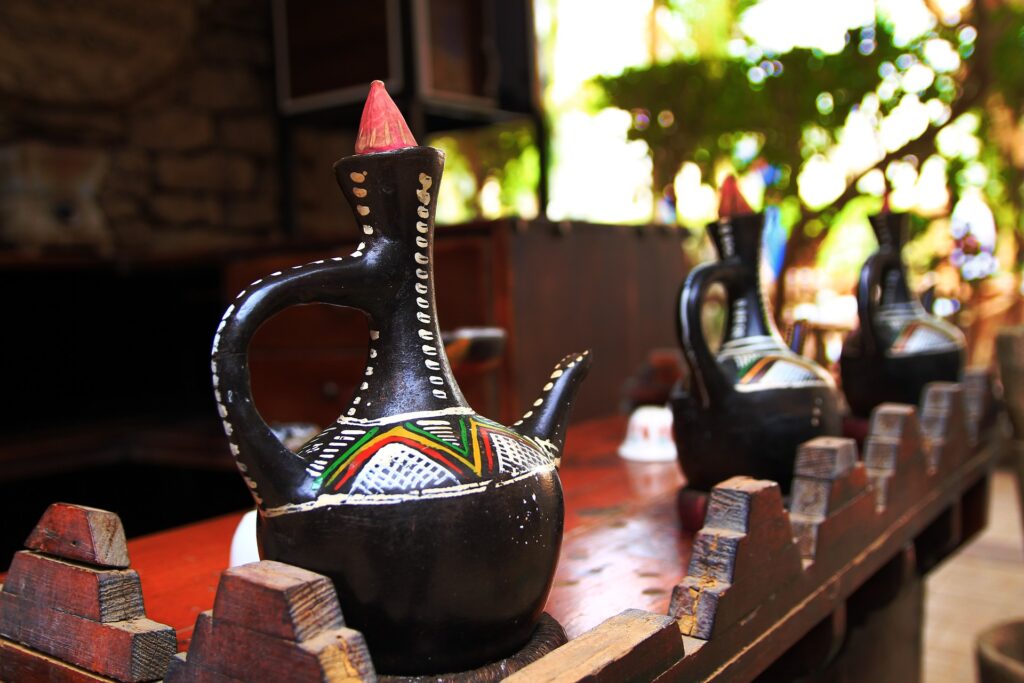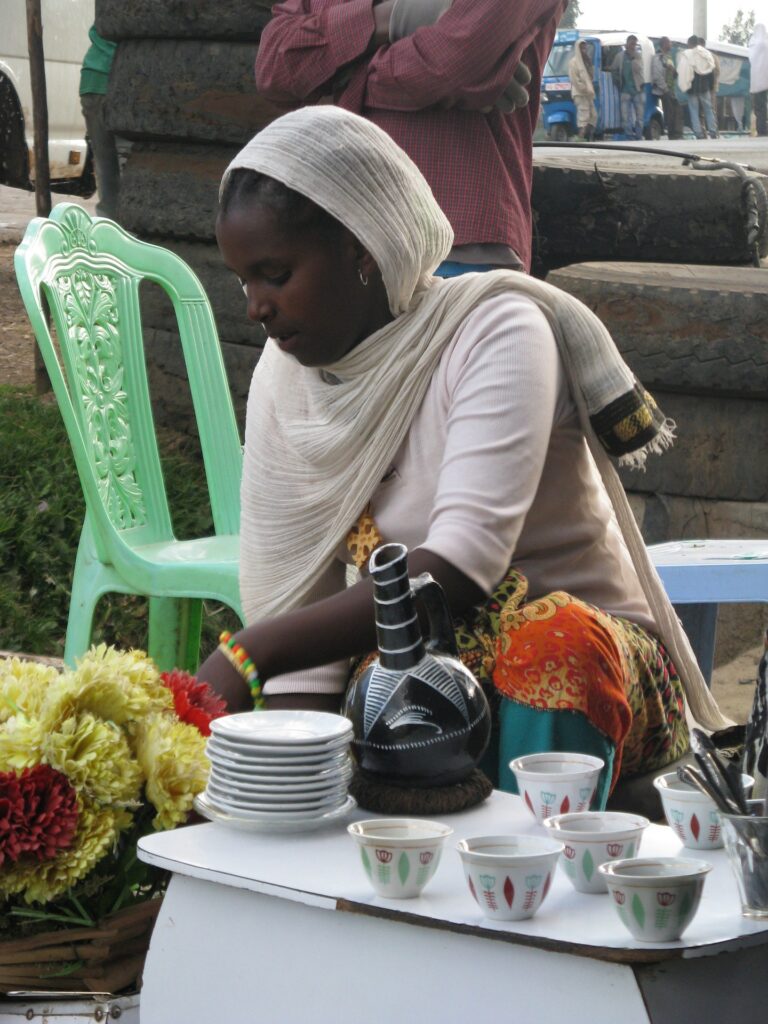I remember the culture shock I felt when I first came to visit America and I realized that coffee was seen as an ‘on the go’ drink. It was evident in the hustle of big coffee shops crammed with people anxiously waiting for their drinks, glancing at their watches, trying to balance their need for a dose of caffeine for the day, and getting to work on time. As an Ethiopian, my relationship with coffee is completely different.
We have a saying in Ethiopia, “Coffee and love taste best when hot”. Coffee in Ethiopia symbolizes more than just a drink. It is our connection to our country’s history, an essential part of our family gatherings, and a way we catch up with friends and welcome guests.
Ethiopia’s connection to coffee stretches back thousands of years. I grew up with the story of how coffee was discovered. We are all taught the story of Kaldi, a goat herder who lived in the Kaffa region in Ethiopia. The story goes that while he was out with his goats one day, he let the goats go out to pasture and he noticed that some of his goats were jumping, baying, and had an air about them that was foreign to Kaldi. Upon further investigation, he found that they had nibbled on some red cherries and, now curious, he tried some himself. Much to his shock, he, just as his goats had, felt a jolt of energy course through him once he ate this mysterious cherry. Excited with his discovery, he rushed home to show his family who advised him to show it to a Monk at a monastery.
Like many new things, coffee was at first met with hostility as the monk whom Kaldi showed the cherries to threw them into a fire. However, as the cherries roasted the aroma that wafted from the fire changed the monk’s mind and the rest is history. While there are deviations that come with a story that has been passed down generations, the conclusion remains the same. Arabica Coffee, the current most consumed around the world, originated in Ethiopia. Coffee is so integral to Ethiopian culture that we developed a ‘traditional’ way of brewing it. To paint the picture of how coffee is brewed, I want to first start by talking about the setup. The names I am using to describe the appliances are in Amharic, which is what my family speaks at home and is widely spoken in Ethiopia. However, Ethiopia is home to various languages that would use different names for these appliances.
The most common set needed to brew coffee includes a Jebena, the traditional coffee pot, a Kesel Mandeja which is a coal burner, and a small table of sorts where we lay out the cups we drink out of called Sini’s. The small table is on top of a small mat, that usually has Ketema which is a type of grass lightly scattered on the mat. In some households there is usually a small incense burner put right in front of the mat, so as the coffee ceremony is happening the smell of the coffee roasting and the incense mingles in the air. For me, the incense adds an air of magic to the ceremony, you can’t help but feel like you’re partaking in something sacred and cherished as you see the smoke from the incense engulfing the room, the smell of the coffee roasting getting stronger, and the chattering of your family getting louder as it goes long into the night.

Traditionally, it is women who carry out the coffee ceremony. They start by washing the coffee (also called Buna in Amharic) and then roast the coffee on a flat pan over coal, and as the coffee roasts it emits the most enticing smell. The smell snakes around the room, making it feel more intimate. When the coffee starts turning black, the woman usually picks up the pan and shakes it lightly in front of the guests’ faces so they can breathe in the smell.
As it was for the monk in the Kaldi story, the aroma is a huge part of the ceremony for a lot of Ethiopians. For my mother, it is her favorite part of the ceremony. She always takes a deep breath in and I would see her whole frame relax, often breaking into a wide smile. Her own mother loved the ceremony and the smell of coffee and when my mum takes that breath and fills her lungs with the enchanting smell she is for a moment transported back in time to when she was a child with her mum and family, warm and toasty in the house on a rainy day out.
The next part of the ceremony is to crush the beans in a ‘Mukecha’ which is like a mortar and pestle. Once the coffee is reduced to a fine powder, it is poured into the Jebena. The Jebena has water that had been boiling while the coffee was being ground, so all that is left is to add the coffee to the Jebena and wait while it boils. Once the coffee is ready, it is poured out into the Sini’s and given to everyone drinking on a little tray. It is common to have some sort of snack with coffee. Snack favorites include freshly made popcorn or some crispy corn roasted over the coals.

The coffee ceremony is what the family usually sits around on a regular day, but it’s symbolic role as the glue or the central point is heightened during national holidays. Those are the days I would wake up to the sound of Mahmoud Ahmed, one of my father’s favorite artists, belting from the stereo in the living room, the smell of incense, and walk out to see Ketema sprinkled everywhere. Family and friends would come to visit and it was common for the festivities to carry on the whole day. With each person coming in, a cup of hot coffee was waiting for them. On special occasions, we would bake traditional bread (also called dabo). Ethiopian Coffee is rich, dark, and slightly bitter which washes down with the freshly baked bread perfectly.
This is what Coffee symbolizes for a lot of Ethiopians. It symbolizes family, a sense of community, tradition and history. The smell of roasting coffee will always smell like home to me, it reminds me of my mother smiling wide and the sounds of me and cousins playing and running around while the adults talk over a cup of coffee. The Ethiopian Coffee ceremony is a unique experience that gives us a glimpse of Ethiopia’s history, present and future and I encourage everyone to seek out friends, family and coffee shops that do the ceremony to get a taste of Ethiopia, a taste of my home.



Very beautifully written! I love learning about the different cultures around this widely-enjoyed drink! Looking forward to learning more!
[…] Now how true the tale of Kaldi and his magical discovery of coffee can neither be confirmed nor denied, what is apparent is that coffee did, in fact, originate from Ethiopia and we have evidence of a tribe known as the Oromo, chewing coffee beans as well. Though the Oromo tradition of chewing coffee beans with animal fat and ghee do not exist today, other ceremonies do. […]